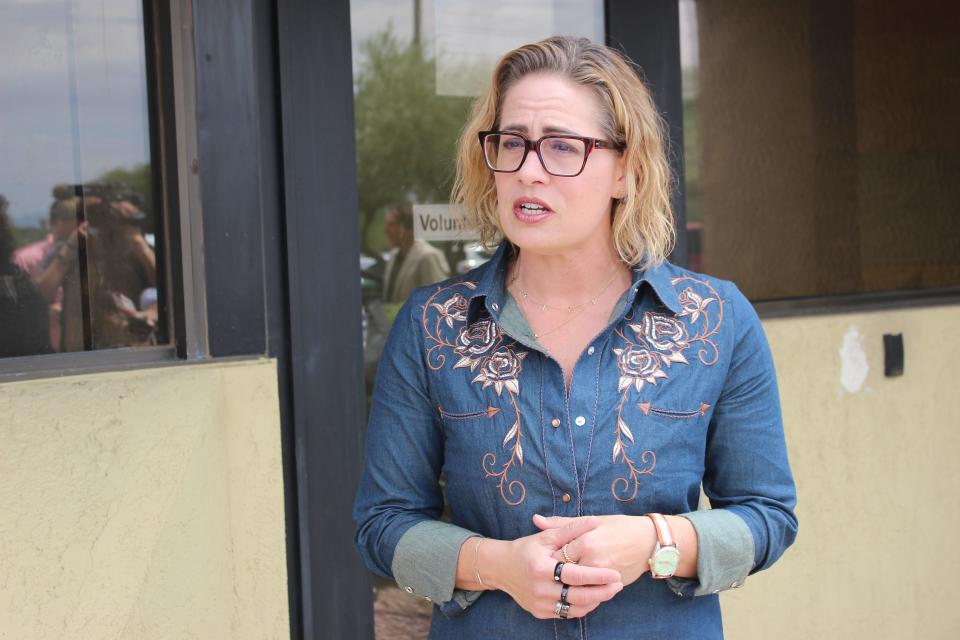Gallego raises concerns with federal humanitarian aid for AZ border communities
- Oops!Something went wrong.Please try again later.
- Oops!Something went wrong.Please try again later.
Arizona Rep. Ruben Gallego raised concerns Wednesday with how the federal government is reimbursing Arizona border communities and nonprofits for helping migrants arriving in the state.
Gallego, D-Ariz., sent a letter to Deanne Criswell, administrator of the Federal Emergency Management Agency, detailing his frustrations with the Alien Registration Number, or A-number, reimbursement model in place. The model poses convoluted bureaucratic obstacles to the costs and operations of migrant aid nonprofits.
The U.S. Department of Homeland Security assigns an A-number to every migrant who is processed into the country in order to identify them. U.S. Customs and Border Protection will give migrants a paper with their A-number, which they are then required to present when they arrive at a shelter.
The paper may be lost or damaged as migrants make their way to the facility. If migrants arrive at shelters with an incomplete or missing A-number, then the nonprofits cannot be reimbursed for the person’s related costs.
“Arizona’s border communities have been unfairly burdened with the immense financial costs of this national crisis and to require additional reimbursement conditions is unacceptable,” Gallego wrote in the letter.

Under the new federal Shelter and Services Program, nonprofits and local governments must front the costs related to housing, transporting and feeding migrants. The federal government will then reimburse them after the governments and nonprofits have submitted the proper paperwork, showing how much they spent and on what.
Under the previous reimbursement program, called the Emergency Food and Shelter Program, nonprofits weren’t punished for not having a complete and correct A-number for every person in their care. They could still prove that the person was in their facilities and get reimbursed without the number.
Migrant aid funding, explained: Federal funding process for humanitarian aid at border comes under scrutiny
“If a local community processes a large group of people without A-numbers, it could cost them thousands of dollars and put their operations at risk,” Gallego wrote.
In the letter, Gallego said he feared that the “overly burdensome” A-number requirement could potentially lead to street releases in Arizona.
In Pima County, there have been 1,080 entries with duplicated A-numbers, 451 incomplete A-number entries and four missing A-number entries from April to the end of July, according to Pima County data.
“They won't reimburse us for those people that we've processed and that puts taxpayers at risk,” said Mark Evans, Pima County communications director. “Under the new funding source, there are different restrictions that are a little bit more cumbersome and concerning for us.”
CBP will validate the A-numbers after they’re submitted but won’t provide them on the front end, citing privacy concerns.
“I agree with the need for oversight and information security. However, there must be some flexibility to respond to realities on the ground,” Gallego added in the letter.
Gallego asked FEMA to either remove the A-number reporting requirement, create a 3%-5% allowance for data errors or mandate internal information sharing between CBP and FEMA so that information other than A-numbers could be used to verify migrants.
“It's absolutely essential that the federal government find a solution for this federal problem,” Evans said. “This is a federal issue and it requires federal funding.”
Southern Arizona nonprofits and Pima County serviced 16,313 migrants in July, per county data. Pima County is spending an average of $1.8 million a month to help migrants, according to Evans.
Arizona will only receive $5.9 million of the $77 million that FEMA announced in the second round of funding through SSP. Pima County only received nearly $11 million under the program.
The SSP funds are estimated to run out in the middle of May, Evans said.
Sinema roundtable: Sen. Kyrsten Sinema slams White House for 'ridiculous' shortchanging of Arizona border communities
“If the funding goes away, neither the city of Tucson nor Pima County will be able to absorb these costs,” Evans said. “All of this is being done to help prevent a humanitarian crisis on the streets of the city.”
Representatives from Gallego's office met with county officials to discuss the issues at Casa Alitas’ Drexel Center in Tucson on Sep. 8, the same day that Arizona Sen. Kyrsten Sinema, I-Ariz., hosted a roundtable at the facility to discuss the same topics.
Gallego is running for Sinema’s Senate seat in 2024. Sinema has filed preliminary paperwork to run for reelection but hasn't officially announced her plans.

During the discussion, Sinema said that the Biden administration “completely shortchanged” Arizona border communities with insufficient funding under SSP. Sinema added that she had a conversation with CBP officials about reforming the reimbursement model.
“This is stupid, like this is absolutely ridiculous,” Sinema said in regard to what she told CBP regarding the model. “Figure this out so that the burden isn't on either the NGO to magically get an A-number out of someone who may have lost the A-number.”
Both Sinema and Gallego have sent letters to FEMA and Homeland Security Secretary Alejandro Mayorkas, detailing their concerns with the SSP and the amount of money that’s being allocated to Arizona communities.
“After continued conversations with entities in Arizona whose funding has been altered under the new allocation, it is clear Arizona’s communities face potentially dire funding cliffs,” Gallego wrote in his Aug. 2 letter to Mayorkas.
Have a news tip or story idea about the border and its communities? Contact the reporter at josecastaneda@arizonarepublic.com or connect with him on X, formerly known as Twitter, @joseicastaneda.
This article originally appeared on Arizona Republic: Gallego raises concerns with federal aid to border nonprofits

